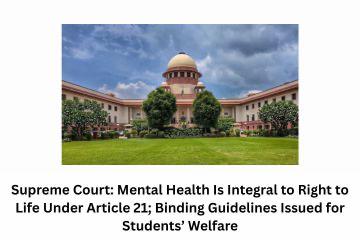In a historic July 2025 ruling in Sukdeb Saha v. State of Andhra Pradesh, the Supreme Court recognized mental health as integral to the right to life under Article 21 of the Indian Constitution. The judgment mandates nationwide implementation of the “Saha Guidelines” to ensure psychological welfare in educational institutions.
The Supreme Court’s landmark verdict marks a transformative moment in India’s constitutional and social consciousness, establishing mental well-being as a fundamental right alongside physical and economic security. The case—sparked by the tragic suicide of a 17-year-old NEET aspirant—has redefined how educational systems must address emotional and psychological health.
Key Highlights
The Ruling: A two-judge bench of Justices Vikram Nath and Sandeep Mehta declared that mental well-being forms an inseparable component of the constitutional right to life under Article 21, thereby holding the State liable for ensuring safe, non-exploitative learning environments for students.
Structural Accountability: The Court referred to the growing mental health crisis among students as a symptom of “structural victimisation”—a system that equates human worth with academic ranks. It called out coaching centres and schools for fostering toxic environments driven by performance anxiety and social comparison.
The “Saha Guidelines”: Drawing parallels with the Vishaka framework, the Court issued 15 interim guidelines directing educational institutions to:
Appoint trained mental health counsellors for every 100 students.
Display helpline numbers like Tele-MANAS across campuses and hostels.
Introduce mental well-being audits and interest-based career counselling.
Ban public ranking, batch segregation, and shaming practices.
Conduct biannual staff training on mental health sensitivity and crisis response.
National Task Force: The ruling ordered formation of a central and state-level Student Well-being Task Force, with CBSE, AICTE, and UGC mandated to monitor compliance within 90 days.
Legal Context: The judgment builds upon the Mental Healthcare Act, 2017, elevating its provisions—particularly the right to care and suicide prevention—from statutory to constitutional status, ensuring that negligence in safeguarding student well-being counts as a rights violation.
Broader Impact: Experts view the verdict as a long-overdue acknowledgment of India’s worsening student suicide epidemic, conflating legal reform with cultural introspection on academic pressure and parental expectations.
A Judicial Blueprint for Emotional Justice
By equating mental wellness with dignity and life itself, the Supreme Court has turned collective grief into a constitutional commitment—signaling that education must nurture, not exhaust, the Indian mind.
Sources: Supreme Court Observer, LiveLaw, Vision IAS, Drishti IAS

